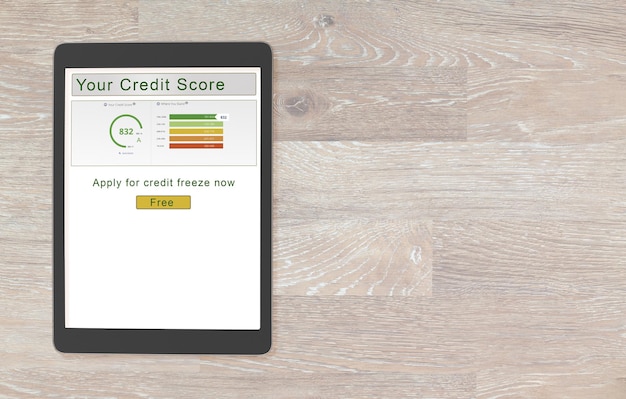Boost Your Credit Score for a Better Job in the US

Boosting your credit score is crucial for securing better job opportunities in the US, as it demonstrates financial responsibility and can positively influence employer perceptions.
Want to land your dream job in the US? Your credit score might be more important than you think. Improving your creditworthiness can significantly boost your credit score, opening doors to better job opportunities and financial stability.
Understanding the Importance of Credit Score in the US Job Market
In the US, your credit score is a key indicator of your financial health. While it’s primarily used by lenders, more employers are now checking credit reports as part of their hiring process. A good credit score can give you a competitive edge.
Many employers view a strong credit score as a sign of responsibility and trustworthiness. Understanding how your credit score impacts your job prospects is the first step to improving it.

Why Employers Care About Your Credit Score
Employers often conduct credit checks to assess a candidate’s reliability and integrity. A high credit score indicates that you manage your finances responsibly, which can translate to responsible behavior in the workplace.
- Financial Responsibility: Shows you can manage debts and obligations.
- Trustworthiness: Suggests you are reliable and accountable.
- Predictive of Job Performance: Some employers believe it correlates with job stability.
For jobs involving financial responsibilities, a good credit score is almost always a requirement. But even for other positions, it can give you an advantage.
Improving your credit score can significantly enhance your chances of securing better job opportunities. By understanding why employers value credit scores, you can start taking steps to improve your creditworthiness and stand out in a competitive job market.
Checking Your Credit Report: The First Step to Improvement
Before you can improve your credit score, you need to know where you stand. Start by checking your credit report from the major credit bureaus to understand your current financial situation.
Regularly reviewing your credit report helps you identify inaccuracies and areas that need improvement. It’s the foundation for building a better credit score and a brighter financial future.
Accessing Your Free Credit Reports
You’re entitled to a free credit report from each of the three major credit bureaus—Equifax, Experian, and TransUnion—once every 12 months. Access these reports through AnnualCreditReport.com.
Reviewing these reports allows you to identify any errors or discrepancies that could be negatively impacting your score. Correcting these errors can lead to an immediate improvement in your credit score.
- AnnualCreditReport.com: The official site for free credit reports.
- Stagger Your Requests: Check one report every four months to monitor your credit throughout the year.
- Identify Errors: Look for inaccuracies such as incorrect account balances or accounts that don’t belong to you.
By regularly checking your credit report, you can stay proactive in managing your credit health and ensure that your credit score accurately reflects your financial behavior. This proactive approach is crucial for maintaining a good credit score and improving your job prospects.
Strategies for Paying Bills on Time and Reducing Debt
One of the most significant factors affecting your credit score is your payment history. Consistently paying your bills on time can dramatically improve your creditworthiness.
Effective debt management is also critical. Reducing your outstanding balances not only boosts your credit score but also improves your overall financial stability.
Implementing Payment Reminders
Set up payment reminders to ensure you never miss a due date. Use tools like calendar alerts, automatic payments, or mobile apps to stay on top of your bills.
Missing a payment, even by a few days, can negatively impact your credit score. Payment reminders help you avoid late fees and maintain a positive payment history.
- Calendar Alerts: Set reminders on your smartphone or computer.
- Automatic Payments: Automate bill payments to ensure timely transactions.
- Mobile Apps: Use budgeting apps to track and manage your bills.
Reducing your debt, especially high-interest debt, is another effective strategy. Focus on paying down credit card balances and other loans to improve your credit utilization ratio, which is the amount of credit you’re using compared to your total available credit.
Paying bills on time and managing debt effectively are foundational steps towards building and maintaining a strong credit score. These habits demonstrate financial responsibility and can positively influence employer perceptions.

Credit Utilization Ratio: Keeping Balances Low
Your credit utilization ratio, or the amount of credit you’re using compared to your total available credit, significantly impacts your credit score. Keeping this ratio low is crucial for maintaining a healthy credit profile.
Aim to use no more than 30% of your available credit on each credit card. This demonstrates to lenders and potential employers that you’re managing your credit responsibly.
Strategies to Lower Your Credit Utilization
Lowering your credit utilization ratio involves a combination of strategies, including paying down balances, increasing your credit limits, and using multiple credit cards wisely.
- Pay Down Balances: Prioritize paying off high-interest credit card balances.
- Increase Credit Limits: Request a credit limit increase from your credit card issuers.
- Balance Transfers: Consider transferring balances to cards with lower interest rates.
For example, if you have a credit card with a $10,000 limit, aim to keep your balance below $3,000. This shows lenders that you’re not over-reliant on credit and that you can manage your spending effectively.
Monitoring your credit utilization ratio regularly is essential. Many credit card issuers offer tools or apps that track your credit utilization and provide insights into your spending habits. Use these resources to stay informed and make adjustments as needed.
Building Credit with Secured Credit Cards and Credit-Builder Loans
If you have limited or no credit history, building credit can seem daunting. However, secured credit cards and credit-builder loans offer accessible pathways to establish and improve your credit profile.
These options are designed to help individuals with little to no credit demonstrate their ability to manage credit responsibly, ultimately boosting their credit score.
Using Secured Credit Cards
Secured credit cards require you to provide a cash deposit as collateral. This deposit typically serves as your credit limit, making it a low-risk option for lenders.
By making regular, on-time payments with a secured credit card, you can demonstrate responsible credit behavior and start building a positive credit history.
- Cash Deposit: The deposit secures your credit line.
- Regular Payments: Consistent on-time payments build credit.
- Graduation to Unsecured Card: After a period of responsible use, you may qualify for an unsecured credit card.
Credit-builder loans are another option. These loans are specifically designed to help you build credit by making regular payments over a set period. The funds are usually held in a savings account and released to you once you’ve completed the repayment schedule.
These tools can be invaluable for individuals looking to establish a credit history and improve their overall creditworthiness. By using these strategies responsibly, you can pave the way for better financial opportunities and enhanced job prospects.
Negotiating with Creditors and Debt Collection Agencies
If you’re struggling with debt, negotiating with creditors and debt collection agencies can be a viable option to reduce your financial burden and improve your creditworthiness.
By reaching out to your creditors and collection agencies, you may be able to negotiate lower interest rates, payment plans, or even settle your debts for a fraction of what you owe.
Effective Negotiation Tactics
Successful negotiation involves careful planning, clear communication, and a willingness to compromise. Prepare your case, understand your financial limitations, and be ready to propose a reasonable solution.
- Prepare Your Case: Gather documentation and understand your financial situation.
- Communicate Clearly: Explain your situation and propose a feasible solution.
- Be Willing to Compromise: Negotiate with an open mind and be ready to meet halfway.
If you’re dealing with debt collection agencies, it’s crucial to know your rights. The Fair Debt Collection Practices Act (FDCPA) protects you from abusive, unfair, or deceptive debt collection practices. Understanding these laws can empower you to negotiate more effectively.
Remember, any agreement you reach with creditors or collection agencies should be documented in writing. This provides legal protection and ensures that both parties are on the same page. Negotiation can be an effective strategy for managing debt and ultimately improving your credit score.
| Key Point | Brief Description |
|---|---|
| ✅ Check Credit Report | Regularly review credit reports for errors and inaccuracies. |
| 📅 Pay Bills On Time | Set up reminders or automatic payments to avoid late fees. |
| 💳 Credit Utilization | Keep balances below 30% of available credit. |
| 💸 Secured Cards/Loans | Use secured cards or credit-builder loans to establish credit history. |
FAQ
▼
Employers often view a good credit score as an indicator of responsibility and trustworthiness. It suggests that you manage your financial obligations effectively, which can translate to reliability in the workplace.
▼
You should check your credit report at least once a year. You are entitled to a free credit report from each of the three major credit bureaus annually, allowing you to monitor your credit health regularly.
▼
A good credit utilization ratio is typically below 30% of your available credit. Keeping your balances low demonstrates that you’re not over-reliant on credit and manage your spending responsibly.
▼
If you find errors on your credit report, dispute them with the credit bureau. Provide documentation to support your claim. The bureau is required to investigate and correct any verified inaccuracies.
▼
While some actions, like paying down balances, can provide a quick boost, improving your credit score is generally a gradual process. Consistency in paying bills on time and managing debt is key for long-term improvement.
Conclusion
Boosting your credit score is an investment in your future, particularly when seeking job opportunities in the US. By understanding the importance of credit scores, regularly monitoring your credit report, and implementing effective strategies to manage debt and build credit, you can significantly improve your creditworthiness and enhance your chances of landing your dream job.
